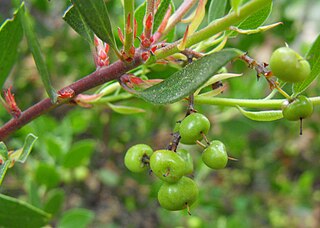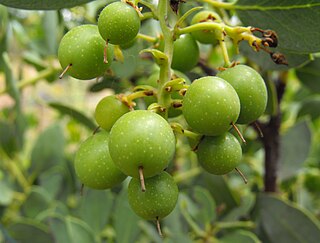
One of many species of manzanita, Arctostaphylos manzanita has the common names common manzanita and whiteleaf manzanita.

Arctostaphylos catalinae, known by the common name Santa Catalina Island manzanita, is a species of manzanita native to Southern California.

Arctostaphylos tomentosa is a species of manzanita known by the common name woollyleaf manzanita or woolley manzanita. This shrub is endemic to California.

Arctostaphylos edmundsii, with the common name Little Sur manzanita, is a species of manzanita. This shrub is endemic to California where it grows on the coastal bluffs of Monterey County.

Arctostaphylos hookeri is a species of manzanita known by the common name Hooker's manzanita.

Arctostaphylos parryana, with the common name Parry manzanita, is a species of manzanita.

Arctostaphylos glandulosa, with the common name Eastwood's manzanita, is a species of manzanita.

Arctostaphylos pallida, commonly known as pallid manzanita, Oakland Hills manzanita, and Alameda manzanita, is an upright manzanita shrub from the Ericaceae, or heath family. It is endemic to the eastern San Francisco Bay Area of Northern California.

Arctostaphylos glauca is a species of manzanita known by the common name bigberry manzanita. It is native to California and Baja California, where it grows in the chaparral and woodland of coastal and inland hills.

Arctostaphylos bakeri is a species of manzanita known by the common name Baker's manzanita. It is endemic to Sonoma County, California, where it grows in the chaparral and woodlands of the North Coast Ranges. It is sometimes a member of the serpentine soils flora.

Arctostaphylos insularis is a species of manzanita known by the common name island manzanita. It is endemic to Santa Cruz Island, one of the Channel Islands of California.

Arctostaphylos luciana is a species of manzanita known by the common name Santa Lucia manzanita, is endemic to California.

Arctostaphylos montaraensis, known by the common name Montara manzanita, is a species of manzanita in the family Ericaceae.

Arctostaphylos myrtifolia is a rare species of manzanita known by the common name Ione manzanita. It is endemic to the Sierra Nevada foothills of California. It grows in the chaparral and woodland plant community on a distinctive acidic soil series, an oxisol of the Eocene-era Ione Formation, in western Amador and northern Calaveras counties. There are only eleven occurrences, of which three have not been recorded since 1976. This is a federally listed threatened species.

Arctostaphylos obispoensis is a species of manzanita, known by the common names bishop manzanita and serpentine manzanita, endemic to California.

Arctostaphylos pajaroensis is a species of manzanita known by the common name Pajaro manzanita. It is endemic to California, where it is known mainly from Monterey County.

Arctostaphylos refugioensis is a species of manzanita, known by the common name Refugio manzanita. It is endemic to Santa Barbara County, California, where it can be found along the immediate coastline, including the vicinity of Refugio State Beach, and into the Santa Ynez Mountains of the northwestern Transverse Ranges.

Arctostaphylos stanfordiana, with the common name Stanford's manzanita, is a species of manzanita that is endemic to northern California. It is known from the outer North Coast Ranges north of the San Francisco Bay Area.

Arctostaphylos rainbowensis is a species of manzanita known by the common name Rainbow manzanita. It is endemic to California, where it is known only from northern San Diego and southern Riverside Counties in the Peninsular Ranges.

Arctostaphylos hooveri, the Santa Lucia manzanita, is a plant species endemic to the Santa Lucia Mountains in Monterey County, California. It grows in woodlands and in chaparral scrub-land at elevations of 900–1200 m.





















